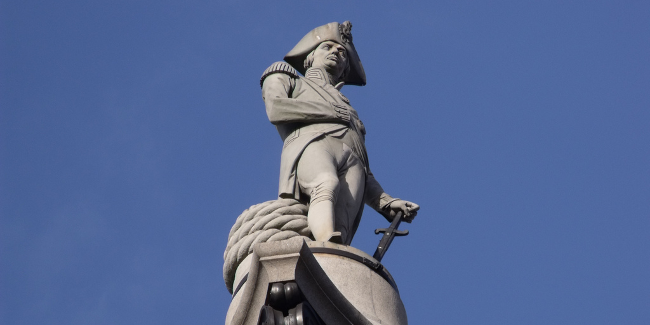The latest call from Graun towers to topple the column of Horatio Nelson – he of Trafalgar fame – validates fears that there is no obvious limiting principle to striking down monuments to our morally grey (or indeed, morally black) forebears.
No naval history buff myself, the past of the famous vice-admiral came as something of a surprise to me. As author
‘Nelson […] was what you would now call, without hesitation, a white supremacist. While many around him were denouncing slavery, Nelson was vigorously defending it. Britain’s best known naval hero – so idealised that after his death in 1805 he was compared to no less than “the God who made him” – used his seat in the House of Lords and his position of huge influence to perpetuate the tyranny, serial rape and exploitation organised by West Indian planters, some of whom he counted among his closest friends.’
During the latest Confederate monument removals in the US, I recalled that Oliver Cromwell’s statue sits right outside Parliament. Cromwell had a central if complex role establishing the legislature as supreme in Britain, but the violence committed by him in Ireland would make his statue ripe for removal under Hirsch’s logic.
Back in the US, many of the founding fathers memorialised around the National Mall in Washington, DC owned slaves. Even Abraham Lincoln, the president most central to abolition of slavery in the US, could be criticised for toying with the idea of setting up special colonies for freed slaves.
The question is ultimately what such memorials represent. Most Britons and tourists will be unaware of Nelson’s advocacy for slavery, or indeed much beyond his victory at Trafalgar and perhaps his affair with Emma Hamilton. To call the column a monument even for extramarital liaisons seems a stretch. For most it’s an empty relic.
As others have pointed out, there is also something Orwellian in the constant desire to extract every ounce of original sin from the West. A forum-goer from The Straight Dope puts it bluntly:
‘…hysterically removing the past to achieve a continuous revolutionary Year Zero (a la the the wishes of much of the English Parliament men in Cromwell’s time and the French Jacobins in Napoleon’s time ) erases everything in the world eventually, since there is nothing existing in all worlds to which some poor gink won’t take offence’
Civilisation in the world is built on the brutishness of our forebears. Whatever the chequered history of great men, tearing down statues can hardly be a healthy reckoning.
And besides, why stop at statues when there are so many religious and imperial buildings testifying to the superstition and rapaciousness of our fathers? Better stop now, I think.
Image credit – Nelson’s Column, October 2009 by Elliott Brown

Lol @ using Cromwell’s statue or slaveowning founding fathers’ statues as a reductio ad absurdum. Yes – smash those statues to pieces and put the pieces in a museum. It’s not erasing history: it’s centring history on the victims rather than the oppressors. “The question is ultimately what such memorials represent,” yes, exactly, but what they represent *to you*, the white author, is not the only perspective that matters. To claim the executive right to decide on the meaning of that symbol is to silence all those for whom it’s an oppressive reminder and say that they just have to deal with it. Well they shouldn’t just have to deal with reminders that the country was built on the dehumanisation of people like them. Also, you can’t support slavery and be a “great man.”
To clarify: the goal would not be to let oppressed people stay ignorant of histories of dehumanisation, but to centre and engage with those histories in order to begin the process of repairing their ongoing effects in the present. So maybe put up a statue of Sam Sharpe on the column?
Also, as a quick follow up, the purpose of erasing history in 1984 was to keep people ignorant in order to serve power. The purpose of re-centring history on the victims is to educate people about histories that have been erased or overlooked so that they can challenge existing power – the direct opposite of what happens in Orwell. Not critically engaging with colonial monuments is itself an act of historical erasure.
Sorry – people misreading Orwell for centrist liberal takes is a bugbear of mine!
I think I answered your point about interpretations in the original piece: ‘Most Britons and tourists will be unaware of Nelson’s advocacy for slavery, or indeed much beyond his victory at Trafalgar and perhaps his affair with Emma Hamilton.’ This is not my view I’m preferring, but a majority one.
I’m also sceptical about the endless fetishising of victims, or more accurately the descendants of such victims (the descendants only being classed as victims through convoluted and – in my view – unconvincing reasoning). One for another time though.
Even from a practical view, quibbling over statues seems a waste of time compared to campaigns one could mount to actually improve the lives of people you think are downtrodden because of Nelson, Crowell and the rest.